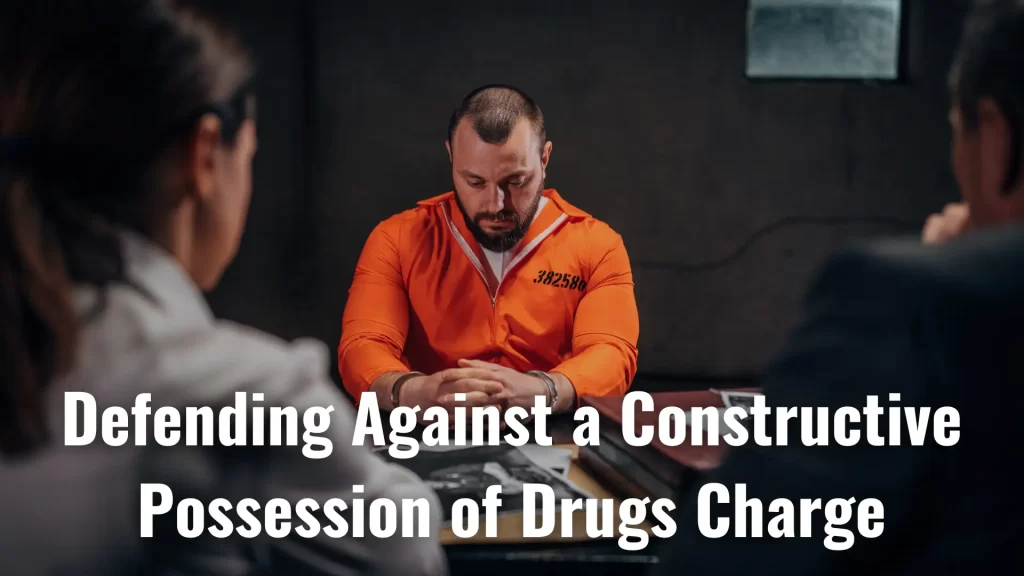Posted on Saturday, June 1st, 2024 at 9:00 am

Facing drug charges in Florida is a serious matter, as a conviction can result in jail time, a fine, and a variety of consequences to your personal and professional life. However, the nature of the charges against you may work to your advantage. If prosecutors have charged you with constructive possession of a controlled substance, proving your guilt may be challenging. Don’t know what to do if charged with constructive possession of drugs? Work with an experienced Pensacola drug possession attorney to achieve a favorable outcome and avoid the consequences associated with a conviction.
Actual Possession vs. Constructive Possession in Florida Drug Cases
Florida law prohibits the actual or constructive possession of a controlled substance unless you obtain it from a licensed provider. If you face charges of actual possession in a drug crime, it means the prosecutor alleges you were arrested with drugs on your person. If you face charges of constructive possession, however, it means the prosecutor alleges drugs were found near you, and you had access to them, but they were not on your actual person.
Requirements to Prove Constructive Possession in Florida
As constructive possession cases involve the police officer arresting someone who does not have drugs on their person, the courts have set higher standards for proving guilt. Don’t know how to beat a constructive possession charge? Typically, prosecutors have to prove three points to convict someone of constructive possession of drugs:
- The Offender Knew the Substance Was Present – This means the person knew that the drugs were in the area. This can be in places such as their car or home. This requirement protects people from cases where someone else plants drugs in their vicinity without the accused knowing.
- The Offender Knew the Substance Was Illegal – Not all illegal drugs and illegal substances are obvious to identify. Some drugs may resemble over-the-counter medications. To be convicted of constructive possession, prosecutors must prove the offender knew the substance was a controlled substance.
- The Offender Could Exercise Control Over the Substance – The defendant in a constructive possession case must have had the ability to take or use the drugs if they wanted. It’s not enough for the drugs to simply be nearby. The prosecution must prove that the defendant had access to and control over them.
Private vs. Public Property in Constructive Possession Cases
Prosecutors typically have to work harder to prove constructive possession if the police arrest someone in a public place. This is because people in public places have less control over the environment around them and the actions of others. Consequently, simply being found close to drugs in a public case is usually not enough to prove constructive possession.
However, it’s a different story if the police find drugs near someone on private property. In these cases, finding drugs nearby could more easily lead to a constructive possession charge.
Defense Strategies in Florida Constructive Possession of Drug Cases

If you face a constructive possession of drugs charge in Florida, there are several strategies a criminal defense lawyer might use. Don’t know how to prove drugs are not yours? For instance, to dispute the prosecution’s case against you, make use of the following strategies:
Lack of Knowledge
Your lawyer can argue that you didn’t know there were drugs present wherever the police arrested you. If you do not have knowledge of the drugs in your vicinity, the authorities can’t hold you responsible for possessing them.
No Control Over the Substance
An attorney can help demonstrate that you didn’t have control over the drugs. Physical possession must be established. If the police found the drugs in a shared space or a space that belonged to someone else, proving you lacked control can be crucial.
Illegal Search and Seizure
A lawyer can challenge the legality of the search that found the drugs. If the police conducted their search without a warrant or probable cause, the court could throw out any evidence they obtained.
Prescription Defense
If the drugs found were prescription medications, an attorney can show that you had a valid prescription. This proves that you had a legal right to possess the substances.
Insufficient Evidence
Your attorney can argue that the prosecution lacks sufficient evidence to prove all elements of constructive possession. If the state can’t establish knowledge and control, and that the substance in question was a controlled substance, they may drop the charges.
Don’t know what to do if charged with constructive possession of drugs? The Morris Firm has the experience, resources, and knowledge to help you fight a drug possession charge in Pensacola. Call (850) 503-2626 today or complete our contact form for a free case evaluation to discuss your situation. Our law offices and our criminal defense attorneys can help you learn more about your legal rights and options.
Related Posts:
What Do You Need to Know About Your Cocaine Possession Charge?
